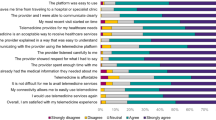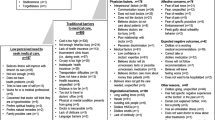Abstract
Background
Although information seeking is encouraged by health care professionals as a positive coping strategy evidence suggests information needs of those affected by cancer are not always fully met. In response to the need for novel models of information provision and educational support for people affected by cancer, a hospital-based cancer information and support centre (CISC) was introduced into a tertiary cancer hospital. Professional support is provided by a cancer support nurse (CSN) with the clinical experience of working with cancer patients, whilst peer support is provided by volunteers.
Materials and methods
A survey was developed to ascertain the perceptions and experiences of consumers (users) of a hospital-based CISC. The aim was to understand what information and support patients and families consider important and helpful in order to develop the service to reflect the needs of its users. During a 12-month period 111 surveys were distributed to users of the centre.
Results
Sixty-nine surveys were returned (62.1%). Nearly all visits were motivated by the need to access (58/84.0%) information, indicating an unmet or changing need. The CSN initiated referrals to support services, both internal and community based, for 21 (53.9%) participants with whom there was contact. Contact with the CISC volunteers also resulted in internal or community-based referrals for 15 (32.6%) of participants. Of note, half of the participants (35/50.7%) reported seeking additional information from the internet as a consequence of having visited the CISC and/or having contact with the CSN or volunteer, in contrast to the six (8.7%) who had reported internet use for information prior to their first visit. Participants indicated a desire for the service to provide additional support to enhance self-care capacity and to do so alongside other people affected by cancer.
Conclusions
Our study results support the capacity of a hospital-based CISC to provide a highly valued service that can broaden information options and meet changing information and support needs of people affected by cancer in an ongoing capacity. An experienced, qualified CSN in this setting is ideally positioned to screen for unmet information and support needs and deliver tailored education to support both inpatient and ambulatory care services. Information prescriptions have the potential to provide a ‘directed information seeking approach’ to those who visit a CISC. Through the use of information technology there is scope to develop information and support that expands beyond pamphlets and booklets.
Similar content being viewed by others
References
Adams E, Boulton M, Watson E (2009) The information needs of partners and family members of cancer patients: a systematic literature review. Patient Educ Couns 77:179–186
Aranda S, Schofield P, Weih L, Yates P, Milne D, Faulkner R, Voudouris N (2005) Mapping the quality of life and unmet meeds of urban women with metastatic breast cancer. Eur J Cancer Care Engl 14:211–222
Balmer C (2005) The information requirements of people with cancer. Where to go after the ‘patient information leaflet’? Cancer Nurs 28:36–44
Butow P, Brindle E, McConnell D, Boakes R, Tattersall M (1998) Information booklets about cancer: factors influencing satisfaction and utilization. Patient Educ Couns 33:129–141
Chelf JH, Agre P, Axelrod A, Cheney L, Cole DD, Conrad K, Hooper S, Liu I, Mercurio A, Stepan K, Villejo L, Weaver C (2001) Cancer-related patient education: an overview of the last decade of evaluation and research. Oncol Nurs Forum 28:1139–1147
Chelf JH, Deshler AMB, Thiemann KMB, Dose AM, Quella SK, Hillman S (2002) Learning and support preferences of adult patients with cancer at a comprehensive cancer centre. Oncol Nurs Forum 29:862–867
Coleman J, Olsen SJ, Sauter PK, Baker D, Hodgin MB, Stanfield C, Emerling A, Hruban RH, Nolan MT (2005) The effect of a frequently asked questions module on a pancreatic cancer web site patient family chat room. Cancer Nurs 28:460–468
Corner J (2008) For your information…. Nurs Manage 15:12–13
Cornwall A, Moore S, Plant H (2008) Embracing technology: patients', family members and nurse specialists' experience of communicating using email. Eur J Oncol Nurs 12:198–208
Coulter A (2007) Evidence on effectiveness of strategies to improve patients' experience of cancer. Macmillan Cancer Support Cancer Reform Strategy Patient Experience Working Group, Oxford, Picker Institute Europe
Coulter A, Ellins J (2007) Effectiveness of strategies for informing, educating and involving patients. BMJ 335:24–27
Dodson L, Bisnauth R, James N (2008) Information is power. Nurs Manage 15:14–19
Fitch M (2000) Supportive care for cancer patients. Hosp Q Summer 3:39–46
Foster C, Scott I, Addington-Hall J (2010) Who visits mobile UK services providing cancer information and support in the community? Eur J Cancer Care Engl 19:221–226. doi:10.1111/j.1365-2354.2008.01007
Gustafson DH, Hawkins R, Pingree S, Mc Tavish F, Arora NK, Medenhall J, Cella DF, Serlin RC, Apantaku FM, Stewart J, Salner A (2001) Effect of computer support on younger women with breast cancer. J Gen Intern Med 16:435–445
Hathaway D (1986) Effect of preoperative instruction on postoperative outcomes: a meta-analysis. Nurs Res 35:269–275
James N, Daniels H, Rahman R, McConkey C, Derry J, Young A (2007) A study of information seeking by cancer patients and their carers. Clin Oncol 19:356–362. doi:10.1016/j.c;on.2007.02.005
Jefford M, Tattersall MHN (2002) Informing and involving cancer patients in their own care. Lancet Oncol 3:629–637
Jones MJ, Nyhof-Young J, Friedman A, Catton P (2001) More than just a pamphlet: development of an innovative computer-based education program for cancer patients. Patient Educ Couns 44:271–278
Lieberman MA, Golant M, Giese-Davis J, Winzlenberg A, Benjamin H, Humphreys K, Kronenwetter C, Russo S, Spiegel D (2003) Electronic support groups for breast carcinoma. Cancer 97:920–925
Leydon GM, Boulton M, Moynihan C, Jones A, Mossman J, Boudioni M, McPherson K (2000) Cancer patients' information needs and information seeking behaviour: in depth interview study. BMJ 320:909–913. doi:10.1136/bmj.320.7239.909
Lillis S, Gibbons V, Lawrenson R (2010) The experience of final year medical students undertaking a general practice run with a distance education component. Rural Remote Health 10:1268
Manning DL, Quigley P (2002) Understanding the needs of people using an information service in Northern Ireland. Eur J Cancer Care Engl 11:139–142
Manning DL, Dickens C (2006) Health literacy: more choice, but do cancer patients have the skills to decide? Eur J Cancer Care Engl 15:448–452
Manning DL, Dickens C (2007) Cancer information and support centres: fixing the parts cancer drugs cannot reach. Eur J Cancer Care Engl 16:33–38. doi:10.1111/j.1365-2354.2006.00699
McCaughan E, McKenna H (2007) Never-ending making sense: towards a substantive theory of the information-seeking behaviour of newly diagnosed cancer patients. J Clin Nurs 16:2096–2104. doi:10.1111/j.1365-2702.2006.01817.x
McDowell ME, Occhipinti S, Ferguson M, Dunn J, Chambers SK (2010) Predictors of change in unmet supportive care needs in cancer. Psychooncology 19:508–515. doi:10.1002/pon.1604
Mills ME, Sullivan K (1999) The importance of information giving for patients newly diagnosed with cancer: a review of the literature. J Clin Nurs 8:631–642
Mills ME, Davidson R (2002) Cancer patient's sources of information: use and quality issues. Psychooncology 11:371–378. doi:10.1002/pon.584
Moody R (2003) Overcoming barriers to delivering information to cancer patients. Br J Nurs 12:1281–1287
Morris SM, Thomas C (2001) The carers place in the cancer situation: where does the carer stand in the medical setting? Eur J Cancer Care Engl 10:87–95
Morris SM, Thomas C (2002) The need to know: informal carers and information. Eur J Cancer Care Engl 11:183–187
National Breast Cancer Centre and National Cancer Centre Control Initiative (2003) Clinical practice guidelines for the psycho-social care of adults with cancer. National Health and Medical Research, Camperdown N.S.W
Roberts S, Black C, Todd K (2002) The living with cancer education programme: II. Evaluation of an Australian education and support programme for cancer patients and their family and friends. Eur J Cancer Care Engl 11:280–289
Roberts S, Schoefield P, Freeman J, Hill D, Akkerman D, Rodger A (2002) Bridging the information and support gap: evaluation of a hospital-based cancer support nurse service. Patient Educ Couns 47:47–55
Rutten LJF, Arora NK, Bakos AD, Aziz N, Rowland J (2005) Information needs and sources of information among cancer patients: a systematic review of research (1980–2003). Patient Educ Couns 57:250–261
Sanson-Fisher R, Girgis A, Boyes A, Bonevski B, Burton L, Cook P (2000) The unmet supportive care needs of patients with cancer. Cancer 88:226–237
Schofield P, Jefford M, Carey M, Thomson K, Evans M, Baravelli C, Aranda S (2008) Preparing patients for threatening medical treatments: effects of a chemotherapy educational DVD on anxiety, unmet needs, and self-efficacy. Support Care Cancer 16:37–45
Schofield P, Diggens J, Charleson C, Marigliani R, Jefford M (2010) Effectively discussing complementary and alternative medicine in a conventional oncology setting: communication recommendations for clinicians. Patient Educ Couns 79:143–151
Skalla KA, Bakitas M, Furstenberg CT, Ahles T, Henderson JV (2004) Patients' need for information about cancer therapy. Oncol Nurs Forum 31:313–319
Smith C, Dickens C, Edwards S (2005) Provision of information for cancer patients: an appraisal and review. Eur J Cancer Care Engl 14:282–288
Sutherland G, Hoey L, White V, Jefford M, Hegarty S (2008) How does a cancer education program impact on people with cancer and their family and friends? J Cancer Educ 23:126–132
Todd K, Roberts S, Black C (2002) The living with cancer education programme: I. Development of an Australian education and support programme for cancer patients and their family and friends. Eur J Cancer Care Engl 11:280–289
Walther JB, Pingree S, Hawkins RP, Buller DB (2005) Attributes of interactive online health information systems. J Med Internet Res 7:e33 (http//www.jmir.org/2005/7/e33/ doi:10.2196/jmir.7.3.e33)
Acknowledgements
We would like to acknowledge The Pratt Foundation for philanthropic support of the Patient Information and Support Centre; staff of the Department of Nursing and Supportive Care Research for their support and assistance with development of the survey tool and Dr. Meinir Krishnasamy for review of the manuscript. Also thanks to The Peer Support Volunteers working in the Cancer Information and Support Centre for their support and assistance with recruitment of participants.
Conflict of interest
The author has none to declare.
Author information
Authors and Affiliations
Corresponding author
Rights and permissions
About this article
Cite this article
Kinnane, N.A. Evaluation of a hospital-based cancer information and support centre. Support Care Cancer 20, 287–300 (2012). https://doi.org/10.1007/s00520-010-1071-y
Received:
Accepted:
Published:
Issue Date:
DOI: https://doi.org/10.1007/s00520-010-1071-y




